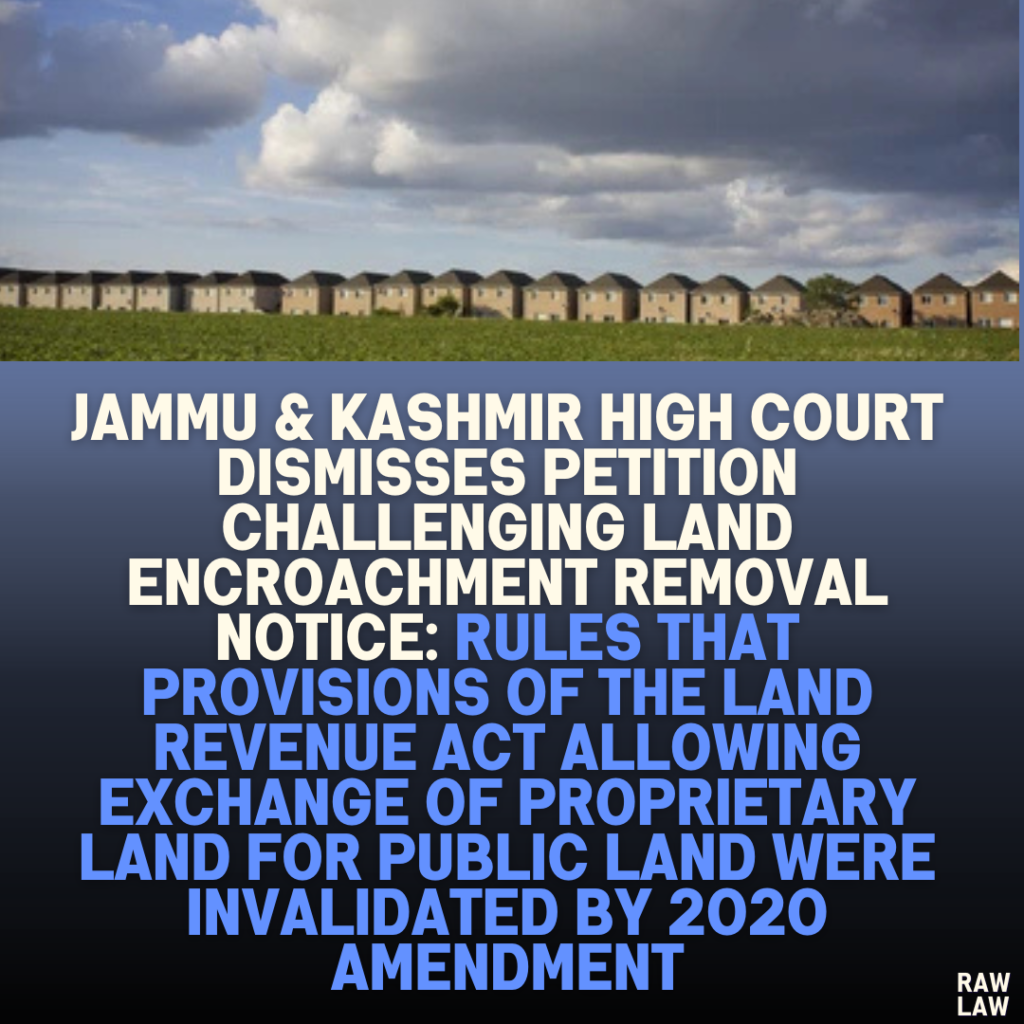Court’s Decision
The High Court of Jammu & Kashmir dismissed the petition challenging a notice for land encroachment removal, citing that the earlier provisions of the Land Revenue Act, which allowed offering proprietary land in exchange, were no longer valid post-amendment in 2020. However, the court granted interim relief by restraining the enforcement of the notice until the petitioners’ representation is decided. The respondents were allowed to take lawful action under the amended provisions following the disposal of the representation.
Facts
- Background of the Petition:
The petitioners challenged a notice issued on November 9, 2024, by the Revenue Department (respondent no. 3), which directed them to remove encroachments on public land (kacharai land) and restore it to its original state within three days. They argued that the notice violated their right to natural justice, as it did not allow them to present their case. - Reliance on Land Revenue Act, SVT 1996:
The petitioners based their claim on Section 133(2)(c) of the Land Revenue Act, which previously allowed an encroacher to offer an equivalent area from their proprietary land in exchange for encroached public land. However, this provision was amended in 2020, removing the right to propose such an exchange. - Relief Sought:
The petitioners sought a writ of mandamus directing the respondents to consider their representation dated November 20, 2024, and decide it in accordance with the earlier provision of Section 133(2)(c). They also sought to quash the impugned notice.
Issues
- Did the notice issued by the respondents violate principles of natural justice by not offering the petitioners a proper opportunity to respond?
- Did the amended Land Revenue Act bar the petitioners from seeking an exchange of proprietary land for public land?
Petitioner’s Arguments
- Procedural Violations:
- The notice issued was not a proper show-cause notice but a final directive, giving no opportunity for the petitioners to explain their position.
- Section 133-C(1) of the Land Revenue Act requires a show-cause notice before enforcing any encroachment removal order.
- Reliance on Pre-Amendment Law:
- The petitioners argued that under the unamended Section 133(2)(c), they had the right to propose an exchange of their proprietary land for the encroached land.
- They claimed the amended provision should not apply retrospectively to their case.
- Impact of the Notice:
- The petitioners contended that the final notice would cause irreparable harm, as it did not allow them to explore their legal rights under the pre-amendment law.
Respondent’s Arguments
- Validity of the Notice:
- The respondents argued that the notice was issued following the amended provisions of the Land Revenue Act, which no longer allowed an exchange of land.
- The petitioners’ reliance on Section 133(2)(c) was misplaced, as the provision was repealed in 2020.
- Precedent Support:
- The respondents cited Mehraj ud Din Malik vs. UT of J&K & Ors. (2022), where a coordinate bench of the court upheld the amended provisions of the Act, which barred any exchange of land in encroachment cases.
- Illegal Encroachment:
- The respondents emphasized that the petitioners had no legal right to retain public land and any procedural error in issuing the notice would not change the substantive illegality of the encroachment.
Analysis of the Law
- Amendments to Section 133:
- The court examined the changes introduced in 2020, which replaced the earlier provisions of Section 133(2)(c) with stricter rules prohibiting encroachment on public land.
- The amended law explicitly eliminated the right to offer proprietary land in exchange, emphasizing the prevention and strict removal of encroachments.
- Section 133-C(1):
- This provision mandates issuing a show-cause notice to the encroacher, giving them a chance to explain before taking coercive action. However, the court noted that even if such a notice had been issued, the petitioners could not have retained the encroached land due to the amended law.
- Doctrine of Useless Formality:
- The court applied this doctrine, holding that even if a procedural requirement (such as a show-cause notice) was not fulfilled, it would not have altered the outcome since the encroachment was illegal.
Precedent Analysis
The court relied on Mehraj ud Din Malik vs. UT of J&K & Ors., where it was held that post-amendment, there is no provision allowing for an exchange of land in encroachment cases. The court reiterated that statutory amendments take precedence over previous rights.
Court’s Reasoning
- The court acknowledged the procedural flaw in not issuing a show-cause notice but held that such an omission was inconsequential in this case.
- The amended provisions precluded any right to exchange land, rendering the petitioners’ reliance on the old law invalid.
- Allowing the petitioners to retain the encroached land, even temporarily, would set a dangerous precedent and undermine the purpose of the amended law.
Conclusion
The court dismissed the petition but granted limited relief:
- The respondents were directed to decide the petitioners’ representation within one week.
- Until then, the impugned notice would not be enforced.
- After the representation’s disposal, the respondents could proceed under the amended law.
Implications
This judgment reinforces the authority of statutory amendments in governing rights and remedies. It highlights that procedural lapses, when inconsequential, cannot be used to delay enforcement against illegal actions. The ruling also establishes that public lands cannot be regularized through outdated laws, ensuring stricter adherence to land management regulations.




Pingback: Delhi High Court Affirms Dismissal of Bank Officer for Fraudulent Credit Note: "Procedural Lapses Must Cause Demonstrable Prejudice to Vitiate Disciplinary Proceedings"; Judicial Review Limited to Procedural Fairness - Raw Law